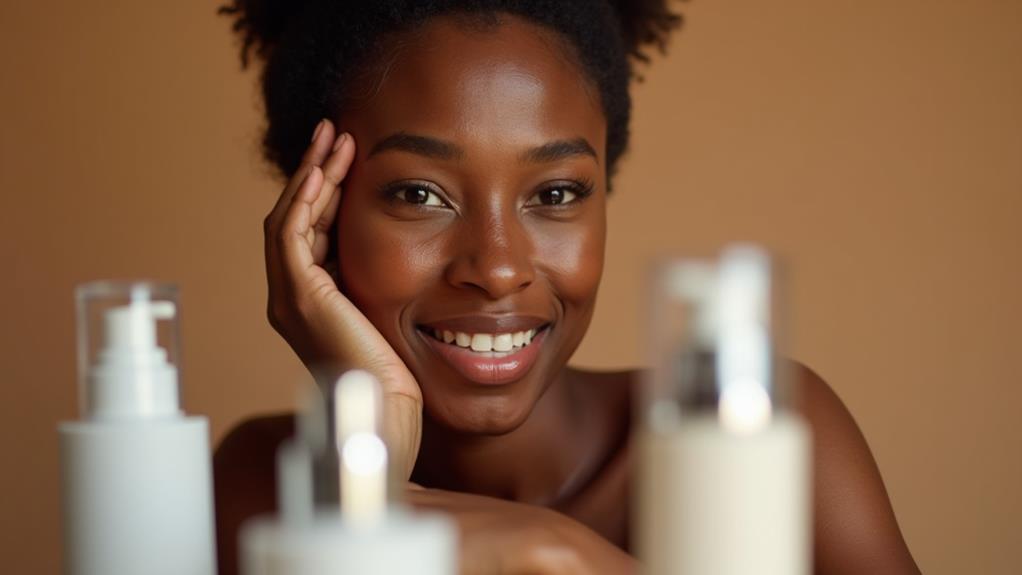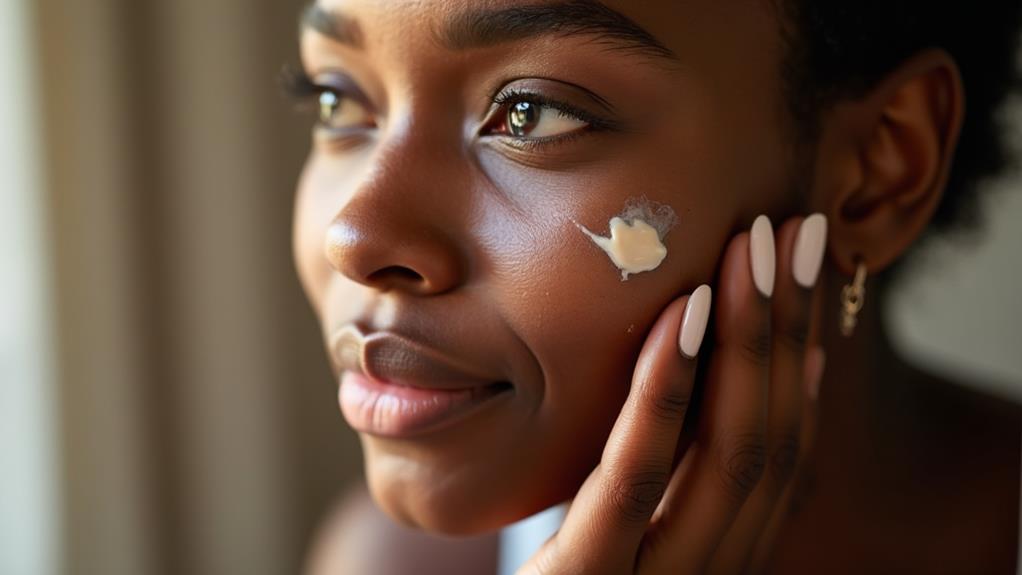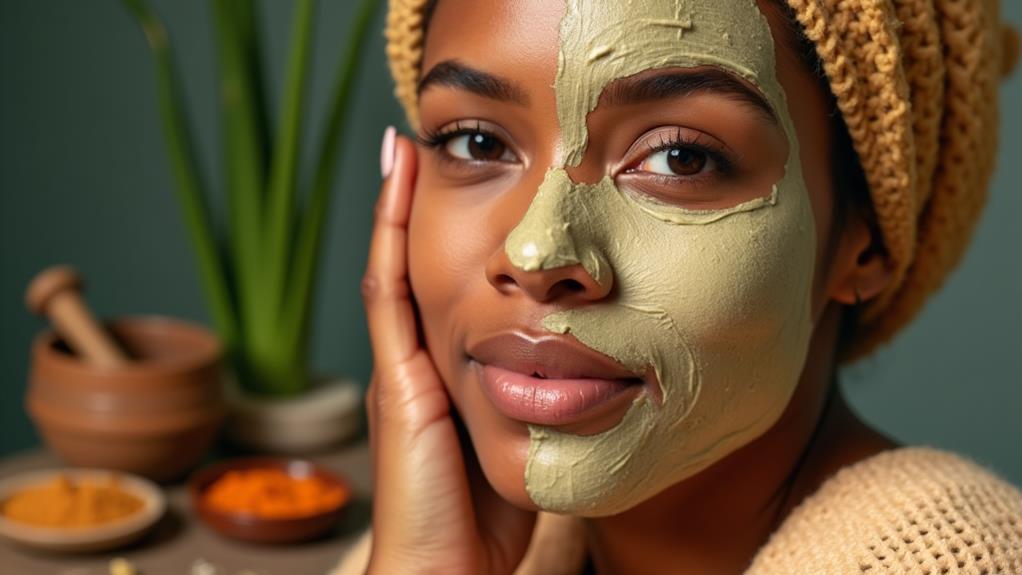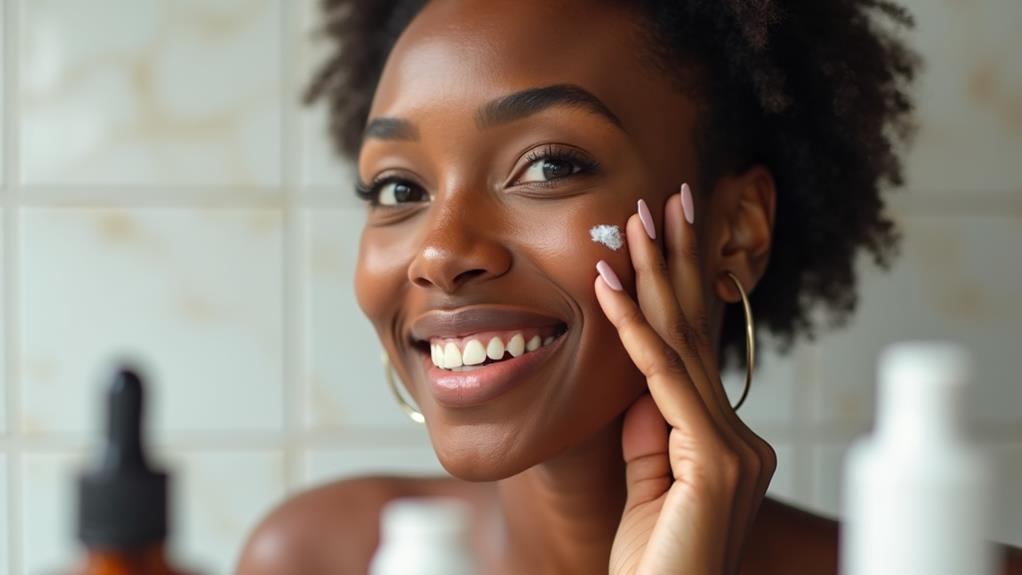Have you ever felt like your skin's playing an endless game of connect-the-dots with acne? If you've got melanin-rich skin, you're not alone in this struggle. Combating acne while preserving your skin's natural glow can feel like walking a tightrope. But don't throw in the towel just yet. There's a world of treatments tailored specifically for your skin type, from over-the-counter solutions to professional procedures. Understanding these options is essential, as the wrong approach could leave you with more than just acne to worry about. Let's explore how you can win the battle against breakouts without compromising your skin's health.
Key Takeaways
- Use salicylic acid for gentle exfoliation and pore unclogging without excessive dryness.
- Incorporate niacinamide to reduce inflammation and even skin tone in melanin-rich skin.
- Apply benzoyl peroxide in low concentrations to combat acne-causing bacteria while minimizing irritation.
- Consider chemical peels or microdermabrasion under professional guidance for effective exfoliation and pore clearing.
- Prevent post-inflammatory hyperpigmentation with daily broad-spectrum sunscreen and targeted treatments like vitamin C.
Understanding Melanin-Rich Skin

Nearly all skin types contain melanin, but melanin-rich skin has a higher concentration of this pigment. Melanin is responsible for giving your skin its color and provides natural protection against UV radiation. If you have melanin-rich skin, you'll typically fall into the Fitzpatrick scale types IV to VI, ranging from olive to deep brown or black.
Your skin's increased melanin content offers several benefits, including better protection from sun damage and slower visible aging. However, it also presents unique challenges, especially when dealing with acne and other skin conditions.
Melanin-rich skin is more prone to hyperpigmentation, where dark spots form after inflammation or injury. You'll need to be cautious when treating acne, as aggressive treatments can lead to post-inflammatory hyperpigmentation.
Your skin may also be more sensitive to certain ingredients and procedures. It's crucial to choose products and treatments specifically formulated for melanin-rich skin to avoid irritation and uneven skin tone.
Understanding your skin type helps you make informed decisions about skincare routines and acne treatments. By recognizing the unique characteristics of melanin-rich skin, you can better address your skin concerns and maintain a healthy, glowing complexion.
Common Acne Concerns
Frequently, those with melanin-rich skin face unique challenges when dealing with acne. You might notice that acne lesions often leave behind dark spots, known as post-inflammatory hyperpigmentation (PIH). This occurs because your skin produces excess melanin in response to inflammation, making the healing process more visible and prolonged.
Another common concern is the increased risk of developing keloids or hypertrophic scars from acne. Your skin's tendency to overproduce collagen during healing can lead to raised, thickened scars that are more noticeable on darker skin tones.
You may also experience folliculitis, which can be mistaken for acne. This condition, caused by inflamed hair follicles, is more prevalent in those with curly or coarse hair typical of melanin-rich skin.
Lastly, you might find that some traditional acne treatments can be too harsh, causing irritation or further hyperpigmentation. It's essential to use products specifically formulated for your skin type to avoid exacerbating these issues.
Understanding these unique concerns will help you choose more effective treatments and develop a skincare routine tailored to your needs.
Over-the-Counter Treatment Options

Exploring over-the-counter options can be a great starting point for treating acne in melanin-rich skin. When choosing products, look for key ingredients that are effective yet gentle on darker skin tones.
Benzoyl peroxide is a popular acne-fighting ingredient, but use it cautiously as it can cause dryness and irritation. Start with a low concentration (2.5%) and gradually increase if needed.
Salicylic acid is another excellent option, as it exfoliates and unclogs pores without causing excessive dryness.
For melanin-rich skin, consider products containing niacinamide, which can help reduce inflammation and even out skin tone. Alpha hydroxy acids (AHAs) like glycolic or lactic acid can also be beneficial, but use them sparingly to avoid irritation.
When treating acne, it's vital to maintain your skin's moisture balance. Look for non-comedogenic moisturizers containing hyaluronic acid or ceramides to keep your skin hydrated without clogging pores.
Always patch test new products and introduce them gradually into your routine. If you don't see improvement after 4-6 weeks or experience persistent irritation, consult a dermatologist for personalized advice and potentially stronger treatment options.
Professional Dermatological Procedures
When over-the-counter treatments don't yield desired results, it's time to contemplate professional dermatological procedures.
For melanin-rich skin, it's essential to choose treatments that won't cause hyperpigmentation or scarring. Chemical peels, using agents like glycolic or salicylic acid, can effectively exfoliate and unclog pores. However, your dermatologist will determine the appropriate strength to avoid irritation.
Microdermabrasion is another option, gently removing dead skin cells and promoting collagen production.
For more severe cases, laser therapy can target acne-causing bacteria and reduce inflammation. Fractional lasers are often preferred for darker skin tones as they minimize the risk of discoloration.
Your dermatologist might also recommend photodynamic therapy, which combines light treatment with photosensitizing agents to destroy acne-causing bacteria.
Alternatively, they may suggest steroid injections for stubborn cystic acne. These injections can quickly reduce inflammation and pain.
Natural Remedies and Ingredients

Natural remedies and ingredients can be powerful allies in treating melanin-rich skin. When dealing with acne, you'll want to focus on options that reduce inflammation and hyperpigmentation without causing irritation.
Tea tree oil is a potent antimicrobial that can help combat acne-causing bacteria. You can dilute it with a carrier oil and apply it directly to blemishes.
Aloe vera is another excellent choice, as it soothes inflammation and promotes healing. Apply fresh aloe gel to affected areas for best results.
Turmeric, known for its anti-inflammatory properties, can be mixed with honey to create a mask that fights acne and evens skin tone.
Green tea, rich in antioxidants, can be used as a toner to reduce sebum production and calm irritated skin.
For hyperpigmentation, consider using natural ingredients like licorice root extract, kojic acid from fermented rice, or vitamin C from citrus fruits. These can help fade dark spots without harsh chemicals.
Remember to patch test any new ingredient and introduce it gradually into your skincare routine. While natural remedies can be effective, severe acne may still require professional treatment.
Skincare Routine for Acne Prevention
A consistent skincare routine is key to preventing acne in melanin-rich skin. Start by cleansing your face twice daily with a gentle, non-comedogenic cleanser. Look for ingredients like salicylic acid or benzoyl peroxide, which can help unclog pores and reduce inflammation.
After cleansing, apply an alcohol-free toner to balance your skin's pH and remove any remaining impurities. Follow with a lightweight, oil-free moisturizer to keep your skin hydrated without clogging pores. Don't skip this step, as even oily skin needs moisture to prevent overproduction of sebum.
Incorporate a targeted acne treatment containing ingredients like niacinamide or tea tree oil. Apply this to problem areas or all over your face, depending on your skin's needs. Use sunscreen daily to protect your skin from hyperpigmentation caused by acne scars.
Exfoliate once or twice a week with a gentle chemical exfoliant, such as glycolic or lactic acid, to remove dead skin cells and prevent clogged pores. Be careful not to over-exfoliate, as this can irritate melanin-rich skin and worsen acne.
Managing Post-Inflammatory Hyperpigmentation

Post-inflammatory hyperpigmentation (PIH) is a common concern for those with melanin-rich skin. It occurs when acne or other skin injuries heal, leaving behind dark spots or patches. To manage PIH effectively, you'll need a combination of prevention and targeted treatments.
First, protect your skin from further damage by applying a broad-spectrum sunscreen daily. This helps prevent existing dark spots from darkening and new ones from forming. Look for products with ingredients like niacinamide, vitamin C, or kojic acid, which can help fade hyperpigmentation over time.
For faster results, consider using chemical exfoliants like alpha-hydroxy acids (AHAs) or beta-hydroxy acids (BHAs). These can help remove dead skin cells and promote cell turnover, gradually fading dark spots.
Retinoids are another powerful option, but start with a low concentration to avoid irritation.
If over-the-counter treatments aren't enough, consult a dermatologist. They may recommend prescription-strength hydroquinone, chemical peels, or laser treatments tailored to your skin type.
Addressing Keloid Scarring
While keloid scarring can affect anyone, it's particularly common in individuals with melanin-rich skin. These raised, thickened scars extend beyond the original injury site and can be challenging to treat.
If you're prone to keloids, prevention is key. Avoid unnecessary piercings or tattoos, and take extra care with wound healing.
For existing keloids, you have several treatment options. Corticosteroid injections are often the first line of defense, reducing inflammation and shrinking the scar.
Cryotherapy, which freezes the keloid tissue, can be effective for smaller scars. For larger or stubborn keloids, you might consider laser therapy or surgical excision, though these carry a risk of keloid recurrence.
Newer treatments like silicone sheets or gels can help prevent keloid formation and may reduce the appearance of existing scars.
Pressure therapy, using specialized garments or bandages, can also be beneficial. In some cases, your dermatologist might recommend a combination of treatments for ideal results.
Diet and Lifestyle Factors

Nutrition plays an essential role in maintaining healthy, radiant melanin-rich skin. You'll want to focus on a diet rich in antioxidants, which help protect your skin from environmental damage. Include plenty of colorful fruits and vegetables, particularly those high in vitamins A, C, and E. These nutrients support collagen production and help reduce inflammation.
Don't forget to stay hydrated by drinking plenty of water throughout the day. Proper hydration helps flush out toxins and keeps your skin plump and supple. Consider incorporating omega-3 fatty acids into your diet through sources like fatty fish, chia seeds, or walnuts to help combat inflammation and maintain skin elasticity.
In terms of lifestyle factors, manage your stress levels through regular exercise, meditation, or other relaxation techniques. Stress can exacerbate skin issues, particularly in melanin-rich skin.
Make certain you're getting enough quality sleep, as this is when your skin repairs itself. Aim for 7-9 hours per night.
Choosing the Right Products
Selecting appropriate skincare products is essential for maintaining healthy melanin-rich skin. When choosing cleansers, opt for gentle, non-comedogenic formulas that won't strip your skin of its natural oils. Look for ingredients like glycolic acid or salicylic acid, which can help exfoliate and unclog pores without causing irritation.
For moisturizers, seek out products with hyaluronic acid or ceramides to hydrate and strengthen your skin barrier. Avoid heavy, oil-based creams that may lead to clogged pores. Instead, choose lightweight, water-based formulations that won't feel greasy on your skin.
When it comes to treatments, consider products containing niacinamide, which can help reduce inflammation and even out skin tone. Vitamin C serums can also be beneficial for brightening and protecting against environmental damage.
Don't forget sunscreen! Choose a broad-spectrum SPF 30 or higher that's specifically formulated for melanin-rich skin. Look for mineral-based options that won't leave a white cast or chemical sunscreens that blend seamlessly into your skin tone.
Always patch test new products before incorporating them into your routine to guarantee they don't cause irritation or breakouts.


